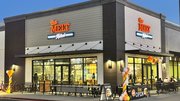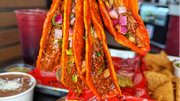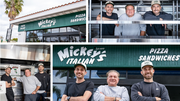Technology
6 digital trends driving fast casual profitability

March 19, 2025 by Cherryh Cansler — Editor, FastCasual.com
Restaurants are done with relying on fragmented, third-party ordering platforms, according to the State of Digital Report created by Qu, a provider of a cloud-native unified commerce platform. The report, based on data from 170 brands across 85,000 locations, revealed that brands are reclaiming the guest relationship and streamlining systems to fuel profitable growth.
"When restaurants own the guest relationship and bring all their data together, they stop operating in the dark," Amir Hudda, CEO of Qu, said in a company press release. "Our report's findings make it clear: holistic, integrated tech gives brands the clarity and agility they need to navigate changing market dynamics and stay ahead of the competition. For franchise systems, this connectivity translates into stronger P&Ls, justifiable tech fees and a more compelling pitch to prospective franchisees."
About 40% of brands said first-party digital sales represented their biggest revenue growth potential in 2025, followed by catering (24%) and on-premises ordering (14%). For QSRs, 55% eyed first-party ordering for revenue growth, outpacing drive-thru and third-party apps. Fast casuals followed with 36% prioritizing direct digital channels.
Reducing reliance on third-party platforms to control costs and improve unit-level economics was just one of six trends revealed. The rest are below.
- Consolidating tech systems to unlock efficiency and prepare brands for AI: 64% of brands are simplifying their tech stack, transitioning to unified systems to reduce costs and eliminate tech debt while aligning the underlying data infrastructure and models. This simplification is freeing up resources for growth and accelerating access to richer data insights — critical for both operational efficiency and AI-powered innovation. For franchises, streamlined systems reduce onboarding time, lower training costs and make scaling easier.
- Data-driven personalization unlocks guest engagement: While loyalty program participation lags, with 85% of guests still unreachable through traditional programs according to Paytronix, operators are shifting investments. Loyalty spending dropped 8% year over year, but investments in guest data platforms increased by 11%.
- Kiosks ease labor strains: About 62% of brands are adding kiosks, with adoption even higher in QSRs (80%). While kiosks are becoming ubiquitous, operators are primarily using them to reduce labor pressures and give guests more flexibility — speeding up service while enhancing the in-store experience.
- Smart kitchens drive accuracy and productivity: With 70% of brands citing order accuracy and team productivity as key operating challenges, many are adopting smart kitchen tech that uses unified data and AI to optimize workflows, minimize errors and improve speed of service, leading to a more consistent guest experience.
- Digital sales level off, pushing brands to focus on profitability: After years of rapid growth, digital sales have plateaued, rising just 4% over the past three years. This signals a shift from chasing volume to refining operations, balancing on-premises and off-premises channels and using data to build sustainable, long-term profits.
Unified data is the foundation of future success
The Qu report underscores one overriding takeaway: success in 2025 hinges on how well brands unify and activate their data. Restaurants that build a connected technology ecosystem that effectively centralizes and unifies their underlying data — integrating first-party channels, AI-driven insights and operational tech — will gain a lasting competitive edge. For franchise brands, this level of connected intelligence isn't just a growth driver — it's a powerful tool for recruiting franchisees and accelerating market expansion, Hudda said.
"In the rush to 'go digital,' many brands built their tech stacks like a Jenga tower — unstable, ready to topple and blocking innovation," he said. "With digital sales growth now stabilizing, restaurants must focus on dismantling these disconnected, legacy systems and adopting more modern, flexible approaches. The next phase of growth lies in using unified data to create more value for guests, improve staff efficiencies and drive lasting profitability."
About Cherryh Cansler
Included In This Story
Qu
Qu is the unified commerce platform helping quick-service and fast-casual restaurants boost efficiency and grow revenue. Purpose-built from the ground up with smart cloud technology, Qu puts real-time intelligence where it’s needed most—right in the restaurant—through its proprietary Business Edge, Qube™.
 ChatGPT
ChatGPT Grok
Grok Perplexity
Perplexity Claude
Claude















